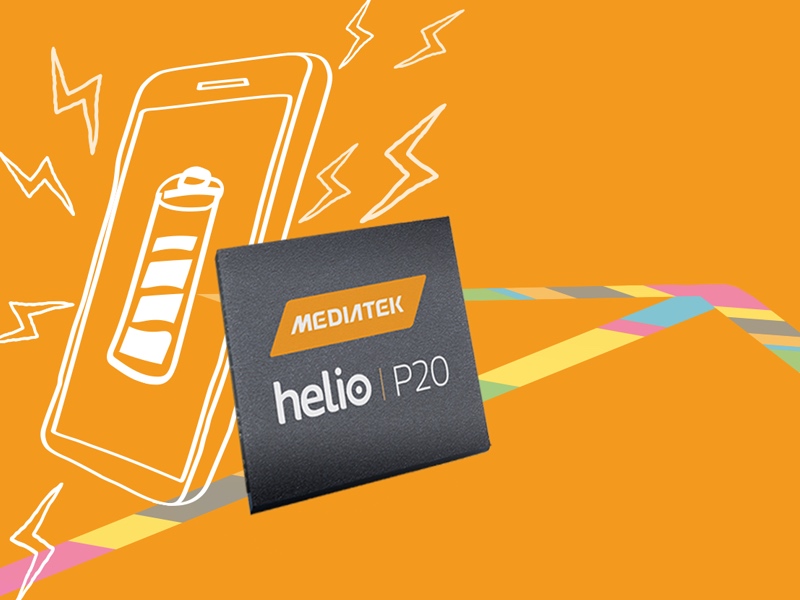- Home
- Mobiles
- Mobiles News
- MediaTek Helio P20 SoC Launched for Smartphones at MWC 2016
MediaTek Helio P20 SoC Launched for Smartphones at MWC 2016

Chipmaker company MediaTek unveiled two new SoC models at the ongoing Mobile World Congress trade show. The company announced the Helio P20, which is the successor to its mid-range P10 SoC. It also unveiled the MT2511, its first bio-sensing analogue front-end chip aimed at the wearable market.
The MediaTek Helio P20, much like its predecessor the Helio P10, is aimed at the mid-range smartphone and tablet lineups. It comes equipped with ARM's latest Mali-T880 GPU, and eight Cortex-A53 cores which have been clocked at 2.3GHz.
The Chinese company says that the new chip is 25 percent more power efficient than the Helio P10. It is built on TSMC's 16nm FinFET Plus (16FF+) process. MediaTek claims that the Helio P20 is industry's first SoC to support Samsung's LPDDR4X RAM module. This, MediaTek claims, provides 70 percent more bandwidth than the LPDDR3 and 50 percent power savings.
Other improvements include support for WorldMode LTE Category 6 and 2x20 carrier aggregation at up to 300Mbps download speeds, and 50Mbps upload speeds. The SoC also supports global dual-SIM dual standby, and LTE multimedia broadcast and multicast service, a feature that allows mobile devices to receive HD video content over LTE.
"MediaTek designed the MediaTek Helio P20 to meet today's consumer demand for sleek, powerful yet highly power efficient mobile devices," said Jeffrey Ju, Executive Vice President and Co-Chief Operating Officer at MediaTek. "Consumers place increasing importance on the battery life and multimedia capabilities of their smartphones. MediaTek has risen to this challenge with a leading solution." Devices with MediaTek Helio P20 SoC will begin shipping in the second quarter of 2016.
The Chinese SoC maker also unveiled the MT2511, its first "bio-sensing analogue front-end (AFE) chip" that is designed to power health and fitness devices. The company says MT2511 is "extremely" power efficient, and provides a lower active mode power consumption of less than 0.6mA when capturing PPG.
The MT2511 comes equipped with MediaTek's built-in "heart beat" interval technology and 4KB SRAM, which it says enables it to optimise overall system power consumption for sleep heart rate monitoring. The SoC also has an integrated LED boost driver for saving layout space.
"The mobile health market is one of the fastest growing technology sectors. We can only begin to imagine how health-related wearables will improve both medical care and everyday wellness all around the world," said JC Hsu, MediaTek's Corporate Vice President and General Manager of the IoT business unit. "With support for ECG and PPG and limited power needs, the fully integrated MT2511 is ideal for a variety of devices, including fitness trackers, active lifestyle smart watches and sports bands."
The MT2511 supports over a 100db dynamic range and high sample rate from 64 to 4KHz, eliminating interference and motion artefacts when collecting the heart's electrical signals. Because it can accumulate accurate pulse data, it can also be used in electromyography (EMG), electroencephalography (EEG), pulse oximetry (SpO2) and blood pressure.
The MT2511 is aimed at IoT and wearable markets. The company says that it will begin mass producing in the first half of 2016.
For the latest tech news and reviews, follow Gadgets 360 on X, Facebook, WhatsApp, Threads and Google News. For the latest videos on gadgets and tech, subscribe to our YouTube channel. If you want to know everything about top influencers, follow our in-house Who'sThat360 on Instagram and YouTube.
Related Stories
- Samsung Galaxy Unpacked 2025
- ChatGPT
- Redmi Note 14 Pro+
- iPhone 16
- Apple Vision Pro
- Oneplus 12
- OnePlus Nord CE 3 Lite 5G
- iPhone 13
- Xiaomi 14 Pro
- Oppo Find N3
- Tecno Spark Go (2023)
- Realme V30
- Best Phones Under 25000
- Samsung Galaxy S24 Series
- Cryptocurrency
- iQoo 12
- Samsung Galaxy S24 Ultra
- Giottus
- Samsung Galaxy Z Flip 5
- Apple 'Scary Fast'
- Housefull 5
- GoPro Hero 12 Black Review
- Invincible Season 2
- JioGlass
- HD Ready TV
- Laptop Under 50000
- Smartwatch Under 10000
- Latest Mobile Phones
- Compare Phones
- Moto G15 Power
- Moto G15
- Realme 14x 5G
- Poco M7 Pro 5G
- Poco C75 5G
- Vivo Y300 (China)
- HMD Arc
- Lava Blaze Duo 5G
- Asus Zenbook S 14
- MacBook Pro 16-inch (M4 Max, 2024)
- Honor Pad V9
- Tecno Megapad 11
- Redmi Watch 5
- Huawei Watch Ultimate Design
- Sony 65 Inches Ultra HD (4K) LED Smart TV (KD-65X74L)
- TCL 55 Inches Ultra HD (4K) LED Smart TV (55C61B)
- Sony PlayStation 5 Pro
- Sony PlayStation 5 Slim Digital Edition
- Blue Star 1.5 Ton 3 Star Inverter Split AC (IC318DNUHC)
- Blue Star 1.5 Ton 3 Star Inverter Split AC (IA318VKU)

















